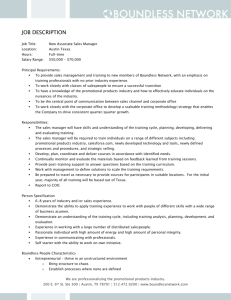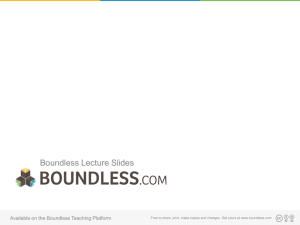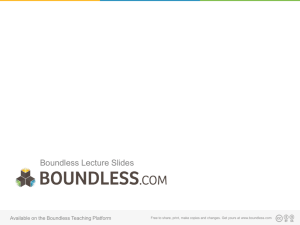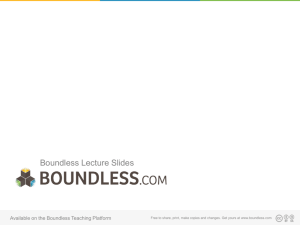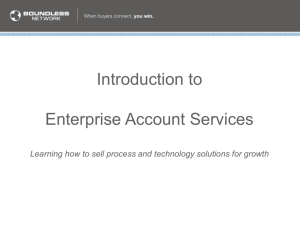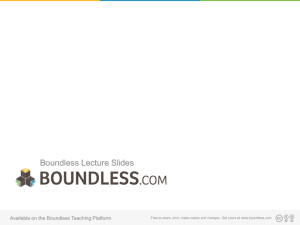Boundless Study Slides
advertisement
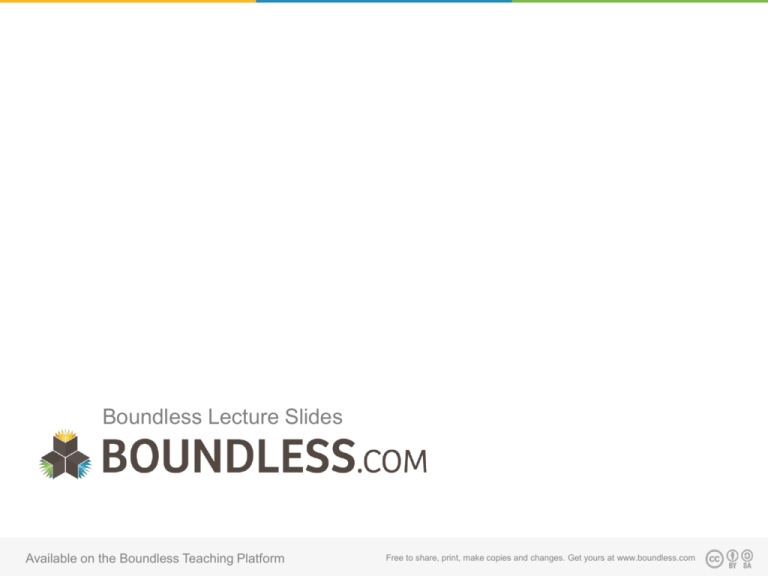
Boundless Lecture Slides Available on the Boundless Teaching Platform Free to share, print, make copies and changes. Get yours at www.boundless.com Boundless Teaching Platform Boundless empowers educators to engage their students with affordable, customizable textbooks and intuitive teaching tools. The free Boundless Teaching Platform gives educators the ability to customize textbooks in more than 20 subjects that align to hundreds of popular titles. Get started by using high quality Boundless books, or make switching to our platform easier by building from Boundless content pre-organized to match the assigned textbook. This platform gives educators the tools they need to assign readings and assessments, monitor student activity, and lead their classes with pre-made teaching resources. Using Boundless Presentations The Appendix The appendix is for you to use to add depth and breadth to your lectures. You can simply drag and drop slides from the appendix into the main presentation to make for a richer lecture experience. Get started now at: http://boundless.com/teaching-platform Free to edit, share, and copy Feel free to edit, share, and make as many copies of the Boundless presentations as you like. We encourage you to take these presentations and make them your own. If you have any questions or problems please email: educators@boundless.com Free to share, print, make copies and changes. Get yours at www.boundless.com About Boundless Boundless is an innovative technology company making education more affordable and accessible for students everywhere. The company creates the world’s best open educational content in 20+ subjects that align to more than 1,000 popular college textbooks. Boundless integrates learning technology into all its premium books to help students study more efficiently at a fraction of the cost of traditional textbooks. The company also empowers educators to engage their students more effectively through customizable books and intuitive teaching tools as part of the Boundless Teaching Platform. More than 2 million learners access Boundless free and premium content each month across the company’s wide distribution platforms, including its website, iOS apps, Kindle books, and iBooks. To get started learning or teaching with Boundless, visit boundless.com. Free to share, print, make copies and changes. Get yours at www.boundless.com Principles of Economics without Economic Models... > Basic Economic Questions Basic Economic Questions • Production Outputs • Production Inputs and Process • Production Recipients • Differences Between Centrally Planned and Market Economies • Mixed Economies Free to share, print, make copies and changes. Get yours at www.boundless.com www.boundless.com/economics?campaign_content=book_5770_section_37&campaign_term=Economics&utm_campaign=powerpoint&utm_medi um=direct&utm_source=boundless Principles of Economics without Economic Models... > Basic Economic Questions Production Outputs • The profit-maximizing amount of output occurs when the marginal cost of producing another unit equals the marginal revenue received from selling that unit. • Output are the quantity of goods or services produced in a given time period, by a firm, industry or country. • There are four types of market scenario that a firm may encounter when making a production decision: economic profit, normal profit, loss-minimizing condition, and shutdown. The firm should always produce unless it encounters a shutdown scenario. Production Conditions View on Boundless.com Free to share, print, make copies and changes. Get yours at www.boundless.com www.boundless.com/economics/textbooks/alternative-to-economics-3rd-paul-krugman-robin-wells-1464128731-9781464128738/principles-ofeconomics-without-economic-models-without-the-study-of-economics-1/basic-economic-questions-37/production-outputs-139- Principles of Economics without Economic Models... > Basic Economic Questions Production Inputs and Process • Capital, otherwise known as capital assets, are manufactured goods that are used in production of goods or services. • Cash is not included in capital in terms of a production input. Homes and personal automobiles are also not included in capital because these items are not directly tied to the production of goods or services. • Labor is a measure of the work done by human beings to create a manufactured output. Girls running warping machines in Loray Mill, Gastonia, N.C. by Lewis Hine, 1908. View on Boundless.com Free to share, print, make copies and changes. Get yours at www.boundless.com www.boundless.com/economics/textbooks/alternative-to-economics-3rd-paul-krugman-robin-wells-1464128731-9781464128738/principles-ofeconomics-without-economic-models-without-the-study-of-economics-1/basic-economic-questions-37/production-inputs-and-process-140- Principles of Economics without Economic Models... > Basic Economic Questions Production Recipients • Supply chains vary based on industry, the resources of the manufacturer, and market conditions. • The purpose of a supply chain is to act as an integrating function that links major business functions and processes into a cohesive business model. • Typical steps in a supply chain include: extraction of raw materials; acquisition of components; production; inventory; transportation; wholesaler; and retailer. Supply Chain View on Boundless.com Free to share, print, make copies and changes. Get yours at www.boundless.com www.boundless.com/economics/textbooks/alternative-to-economics-3rd-paul-krugman-robin-wells-1464128731-9781464128738/principles-ofeconomics-without-economic-models-without-the-study-of-economics-1/basic-economic-questions-37/production-recipients-141- Principles of Economics without Economic Models... > Basic Economic Questions Differences Between Centrally Planned and Market Economies • A pure planned economy has one person or group who controls what is produced; all businesses work together to produce goods and services that are planned and distributed by the government. • Planned economies have several advantages. Ideally, there is no unemployment, and needs never go unfulfilled; because the government knows how much food, medicine, and other goods is needed, it can produce enough for all. • Realistically, these systems tend to suffer from large inefficiencies and are overall not as successful as other types of economic systems. • A pure market economy is one perfectly free of external control. Individuals are left up to themselves to decide what to produce, who to work for, and how to get V.I. Lenin View on Boundless.com the things they need. • Because there is no regulation ensuring equality and fairness, market economies are burdened with unemployment, and even those with jobs can never be certain that they will make enough to provide for all of their needs. • Because they do not need to wait for word from the government before changing their output, companies under market economies can quickly keep up with fluctuations in the economy, tending to be more efficient than regulated markets. Free to share, print, make copies and changes. Get yours at www.boundless.com www.boundless.com/economics/textbooks/alternative-to-economics-3rd-paul-krugman-robin-wells-1464128731-9781464128738/principles-ofeconomics-without-economic-models-without-the-study-of-economics-1/basic-economic-questions-37/differences-between-centrally-planned-and- Principles of Economics without Economic Models... > Basic Economic Questions Mixed Economies • Most of the means of production in a mixed economy are privately owned in a mixed economy. • The government strongly influences the economy through direct intervention in a mixed economy, such as through subsidies and regulation of the markets. • Most government intervention in mixed economy is limited to minimizing the negative consequences of economic events, such as unemployment in recessions, to promote social welfare. View on Boundless.com Free to share, print, make copies and changes. Get yours at www.boundless.com www.boundless.com/economics/textbooks/alternative-to-economics-3rd-paul-krugman-robin-wells-1464128731-9781464128738/principles-ofeconomics-without-economic-models-without-the-study-of-economics-1/basic-economic-questions-37/mixed-economies-143- Appendix Free to share, print, make copies and changes. Get yours at www.boundless.com Principles of Economics without Economic Models... Key terms • autonomy Self-government; freedom to act or function independently. • average total cost Average cost or unit cost is equal to total cost divided by the number of goods produced (the output quantity, Q). It is also equal to the sum of average variable costs (total variable costs divided by Q) plus average fixed costs (total fixed costs divided by Q). • capital Already-produced durable goods available for use as a factor of production, such as steam shovels (equipment) and office buildings (structures). • Centrally planned economy When the government is responsible for setting the amount produced. • fixed costs A cost of business which does not vary with output or sales; overheads. • input Something fed into a process with the intention of it shaping or affecting the outputs of that process. • labor The workers used to manufacture the output. • marginal cost The increase in cost that accompanies a unit increase in output; the partial derivative of the cost function with respect to output. Additional cost associated with producing one more unit of output. • market economy An economy in which goods and services are exchanged in a free market, as opposed to a state-controlled or socialist economy; a capitalistic economy. • mixed economy A system in which both the state and private sector direct the economy, reflecting characteristics of both market economies and planned economies. • monopoly A market where one company is the sole supplier. • supply chain A system of organizations, people, technology, activities, information and resources involved in moving a product or service from supplier to customer. Free to share, print, make copies and changes. Get yours at www.boundless.com Principles of Economics without Economic Models... • variable cost A cost that changes with the change in volume of activity of an organization. Free to share, print, make copies and changes. Get yours at www.boundless.com Principles of Economics without Economic Models... V.I. Lenin The Soviet Union, as established by V.I. Lenin, is an example of a country that tried to establish a pure centrally planned economy. Free to share, print, make copies and changes. Get yours at www.boundless.com Wikipedia. "Lenin CL." Public domain http://en.wikipedia.org/wiki/File:Lenin_CL.jpg View on Boundless.com Principles of Economics without Economic Models... Production Conditions A firm will seek to produce such that its marginal cost (MC) is equal to marginal revenue (MR, which is equal to the price and demand). It is not produced based on average total cost (ATC). Free to share, print, make copies and changes. Get yours at www.boundless.com Wikipedia. "Profit max marginal small." CC BY-SA http://en.wikipedia.org/wiki/File:Profit_max_marginal_small.svg View on Boundless.com Principles of Economics without Economic Models... Girls running warping machines in Loray Mill, Gastonia, N.C. by Lewis Hine, 1908. Any tool or machine that could be used to improve someone's ability to work would be included in capital. Free to share, print, make copies and changes. Get yours at www.boundless.com Wikimedia. "Girls running warping machines in Loray Mill, Gastonia, N.C.Many boys and girls much younger.Boss carefully avoided... - NARA - 523104." Public domain Principles of Economics without Economic Models... Supply Chain This represents the typical supply chain for a computer. The right half of the chart represents the steps it takes from producing the final product to the consumers. Free to share, print, make copies and changes. Get yours at www.boundless.com Wikipedia. "Supply and demand network (en)." CC BY-SA http://en.wikipedia.org/wiki/File:Supply_and_demand_network_(en).png View on Boundless.com Principles of Economics without Economic Models... A firm is producing a good that has a price greater than its variable cost but less than its average total cost. What type of scenario does this describe? A) Economic Profit B) Normal Profit C) Loss-minimizing condition D) Shutdown Free to share, print, make copies and changes. Get yours at www.boundless.com Principles of Economics without Economic Models... A firm is producing a good that has a price greater than its variable cost but less than its average total cost. What type of scenario does this describe? A) Economic Profit B) Normal Profit C) Loss-minimizing condition D) Shutdown Free to share, print, make copies and changes. Get yours at www.boundless.com Boundless - LO. "Boundless." CC BY-SA 3.0 http://www.boundless.com/ Principles of Economics without Economic Models... Which of the following is an example of the production input capital? A) Cash invested in the business. B) A personal car. C) A work force. D) A cell phone. Free to share, print, make copies and changes. Get yours at www.boundless.com Principles of Economics without Economic Models... Which of the following is an example of the production input capital? A) Cash invested in the business. B) A personal car. C) A work force. D) A cell phone. Free to share, print, make copies and changes. Get yours at www.boundless.com Boundless - LO. "Boundless." CC BY-SA 3.0 http://www.boundless.com/ Principles of Economics without Economic Models... Which of the following is a market actor that is involved in transferring a product from production to the end consumer? A) Inventory manager. B) Wholesaler. C) Retailer. D) All of these answers. Free to share, print, make copies and changes. Get yours at www.boundless.com Principles of Economics without Economic Models... Which of the following is a market actor that is involved in transferring a product from production to the end consumer? A) Inventory manager. B) Wholesaler. C) Retailer. D) All of these answers. Free to share, print, make copies and changes. Get yours at www.boundless.com Boundless - LO. "Boundless." CC BY-SA 3.0 http://www.boundless.com/ Principles of Economics without Economic Models... Which of the following characteristics describe a capitalist economic system? A) Market based coordination, private ownership, and material compensation B) Central planning, private ownership, and moral compensation C) Market based coordination, public ownership, and material compensation D) Central planning, public ownership, and moral compensation Free to share, print, make copies and changes. Get yours at www.boundless.com Principles of Economics without Economic Models... Which of the following characteristics describe a capitalist economic system? A) Market based coordination, private ownership, and material compensation B) Central planning, private ownership, and moral compensation C) Market based coordination, public ownership, and material compensation D) Central planning, public ownership, and moral compensation Free to share, print, make copies and changes. Get yours at www.boundless.com Boundless - LO. "Boundless." CC BY-SA 3.0 http://www.boundless.com/ Principles of Economics without Economic Models... What are the two dominant forms of market coordination mechanisms? A) Centralized planning and de-centralized planning B) Market based coordination and material reward incentives C) Material reward incentives and moral reward incentives D) Central planning and market based coordination Free to share, print, make copies and changes. Get yours at www.boundless.com Principles of Economics without Economic Models... What are the two dominant forms of market coordination mechanisms? A) Centralized planning and de-centralized planning B) Market based coordination and material reward incentives C) Material reward incentives and moral reward incentives D) Central planning and market based coordination Free to share, print, make copies and changes. Get yours at www.boundless.com Boundless - LO. "Boundless." CC BY-SA 3.0 http://www.boundless.com/ Principles of Economics without Economic Models... Which of the following is a characteristic of a mixed economy? A) All of these answers. B) The means of production are privately owned. C) The government can grant monopolies to private businesses. D) The government regulates the market through labor laws and other similar regulation. Free to share, print, make copies and changes. Get yours at www.boundless.com Principles of Economics without Economic Models... Which of the following is a characteristic of a mixed economy? A) All of these answers. B) The means of production are privately owned. C) The government can grant monopolies to private businesses. D) The government regulates the market through labor laws and other similar regulation. Free to share, print, make copies and changes. Get yours at www.boundless.com Boundless - LO. "Boundless." CC BY-SA 3.0 http://www.boundless.com/ Principles of Economics without Economic Models... Attribution • Wikipedia. "Economic profit." CC BY-SA 3.0 http://en.wikipedia.org/wiki/Economic_profit#Economic_profit • Wikipedia. "Output." CC BY-SA 3.0 http://en.wikipedia.org/wiki/Output#Economics • Wikipedia. "Microeconomics." CC BY-SA 3.0 http://en.wikipedia.org/wiki/Microeconomics#Modes_of_operation • Wikibooks. "IB Economics/Microeconomics/Theory of the Firm (HL)." CC BY-SA 3.0 http://en.wikibooks.org/wiki/IB_Economics/Microeconomics/Theory_of_the_Firm_(HL) • Wiktionary. "fixed costs." CC BY-SA 3.0 http://en.wiktionary.org/wiki/fixed+costs • Wiktionary. "variable cost." CC BY-SA 3.0 http://en.wiktionary.org/wiki/variable+cost • Wiktionary. "marginal cost." CC BY-SA 3.0 http://en.wiktionary.org/wiki/marginal+cost • Wikipedia. "average total cost." CC BY-SA 3.0 http://en.wikipedia.org/wiki/average%20total%20cost • Wikipedia. "Labour economics." CC BY-SA 3.0 http://en.wikipedia.org/wiki/Labour_economics#Demand_for_labour_and_wage_determination • Wikipedia. "Capital (economics)." CC BY-SA 3.0 http://en.wikipedia.org/wiki/Capital_(economics) • Wikipedia. "Factors of production." CC BY-SA 3.0 http://en.wikipedia.org/wiki/Factors_of_production • Wikipedia. "Production (economics)." CC BY-SA 3.0 http://en.wikipedia.org/wiki/Production_(economics) • Boundless Learning. "Boundless." CC BY-SA 3.0 http://www.boundless.com//economics/definition/labor • Wiktionary. "capital." CC BY-SA 3.0 http://en.wiktionary.org/wiki/capital • Wiktionary. "input." CC BY-SA 3.0 http://en.wiktionary.org/wiki/input • Wikibooks. "Transportation Economics/Supply chains." CC BY-SA 3.0 http://en.wikibooks.org/wiki/Transportation_Economics/Supply_chains#Supply_Chains • Wikipedia. "Retailer." CC BY-SA 3.0 http://en.wikipedia.org/wiki/Retailer Free to share, print, make copies and changes. Get yours at www.boundless.com Principles of Economics without Economic Models... • Wikipedia. "Wholesaler." CC BY-SA 3.0 http://en.wikipedia.org/wiki/Wholesaler • Wikipedia. "Supply chain." CC BY-SA 3.0 http://en.wikipedia.org/wiki/Supply_chain • Wiktionary. "supply chain." CC BY-SA 3.0 http://en.wiktionary.org/wiki/supply+chain • Wikibooks. "Principles of Economics/Economic Systems." CC BY-SA 3.0 http://en.wikibooks.org/wiki/Principles_of_Economics/Economic_Systems#Mixed_Economies • Boundless Learning. "Boundless." CC BY-SA 3.0 http://www.boundless.com//economics/definition/centrally-planned-economy • Wiktionary. "market economy." CC BY-SA 3.0 http://en.wiktionary.org/wiki/market+economy • Wiktionary. "autonomy." CC BY-SA 3.0 http://en.wiktionary.org/wiki/autonomy • Wikipedia. "Mixed economy." CC BY-SA 3.0 http://en.wikipedia.org/wiki/Mixed_economy • Wikibooks. "Principles of Economics/Economic Systems." CC BY-SA 3.0 http://en.wikibooks.org/wiki/Principles_of_Economics/Economic_Systems#Mixed_Economies • Boundless Learning. "Boundless." CC BY-SA 3.0 http://www.boundless.com//economics/definition/monopoly • Wikipedia. "mixed economy." CC BY-SA 3.0 http://en.wikipedia.org/wiki/mixed%20economy Free to share, print, make copies and changes. Get yours at www.boundless.com

